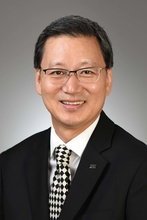When Department of Prosthodontics Chair Aaron (Seok Hwan) Cho joined the University of Iowa College of Dentistry in 2022, he brought knowledge of a new wave of technological prosthodontics innovations that will benefit patients, clinicians, and students.
Reflecting on his experiences as a student in South Korea, Aaron recalls the challenges faculty faced in keeping up with technology and how they would travel abroad for further education.
Aaron earned his DDS from Seoul National University in South Korea before coming to the United States. He completed the Advanced Specialty Program in Prosthodontics at Texas A&M University College of Dentistry (formerly Baylor College of Dentistry) where he was associate professor and graduate program director of prosthodontics.

“I liked to be the graduate pros program director because it was really rewarding to watch students grow over several years,” Aaron said, “It’s kind of like a family.”
However, the landscape shifted with the arrival of the COVID-19 pandemic. The department saw a wave of retirements among full-time faculty, leaving Aaron as the sole member in the Graduate Prosthodontic program. Balancing long hours and limited personal flexibility, Aaron sought a change. This quest led him to Iowa's prosthodontics department. Clark Stanford began as dean of the College of Dentistry April 1, 2022. Aaron was excited to have a fellow prosthodontist as his dean at Iowa and brought a forward-thinking mindset to Iowa City.
“When I started in Texas I focused on digital because I really like the computer, but our grad pros program was struggling financially,” Aaron said, “The lab fees were very expensive, but residents really wanted to learn new things. We spent a lot of money and within five years we increased our revenue six times, so that was my experience with digital dentistry.”
Transitioning from Texas to Iowa, Cho's focus on digital dentistry remained strong. Having experienced success in Texas with digital dentistry despite financial challenges, he recognized its potential for transforming the field. Aaron envisions a digital future for prosthodontics, where integration into the curriculum would enhance patient care, clinical practices, and student education.
“It benefits everyone,” Aaron said, “For patients, it is quicker and easy to repair and replace because all the data is stored digitally. For instance, in conventional full mouth reconstruction anything that is broken you have to make from scratch, and it is very time consuming and then the patient pays again. But now, your information is in a computer, and you can just remake (re-3Dprint or re-mill) a restoration without any extra work, which makes it much easier for the patient and clinician.”
With younger generations becoming more technologically adept, digital dentistry is moving to the forefront, especially in prosthodontics where Computer Aided Design (CAD) and Computer Aided Manufacturing (CAM) can greatly impact the profession. Aaron's aspiration is to foster innovation through curriculum enhancements, steering away from conventional teaching methods to equip students with modern skills and knowledge.
“My goal, my vision is to innovate,” Aaron said, “We are changing the curriculum to address innovations because we don’t want to be old school. We need alignment with the leadership of Dr. Stanford and Executive Associate Dean Dr. Schneider, who recognize the need for an adaptable prosthodontics program. That’s what I want to improve most.”
In this journey of transformation, Aaron’s ultimate goal is to drive innovation and curriculum change, positioning the Prosthodontic department at the forefront of modern dentistry.
To that end, he recently taught a continuing education webinar for the American College of Prosthodontists, Thinking Game for Full Mouth Reconstruction, detailing digital approaches to treatment planning for full mouth reconstruction. The course is still available via a recording.